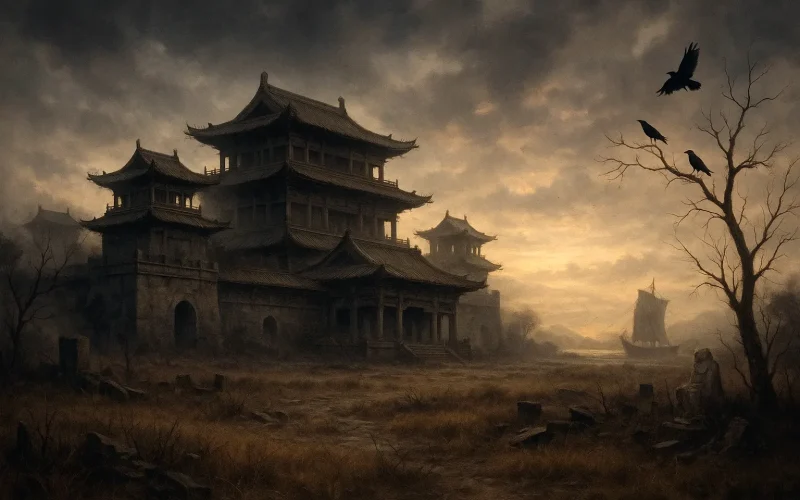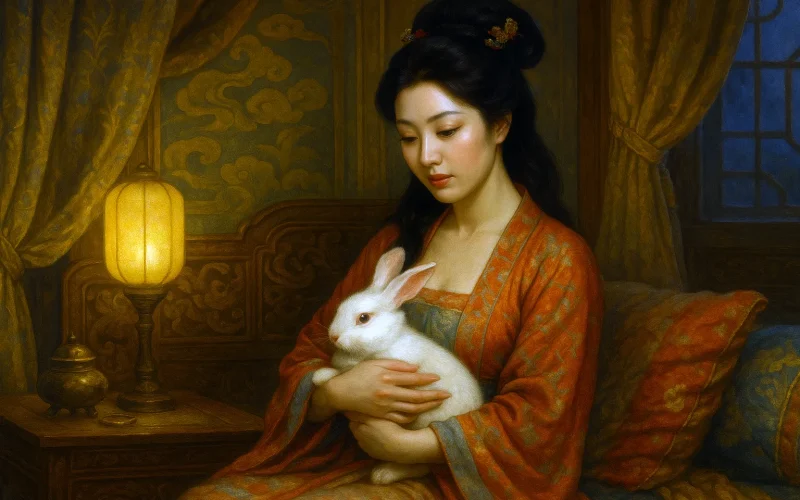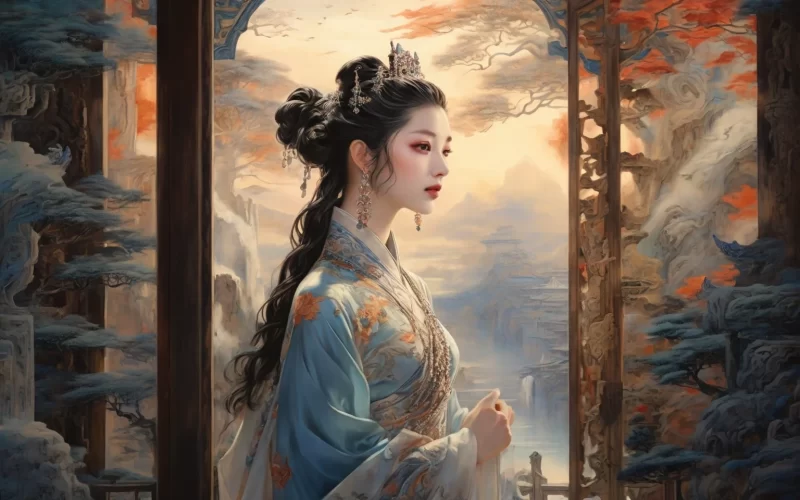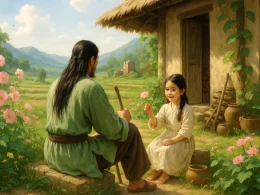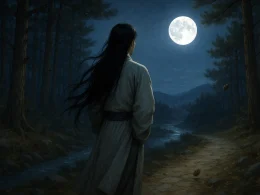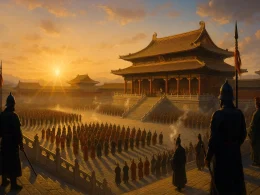When gaily the Emperor toured the south
Contrary to every warning,
His whole empire cut brocades,
Half for wheel-guards, half for sails.
Original Poem
「隋宫」
李商隐
紫泉宫殿锁烟霞,欲取芜城作帝家。
玉玺不缘归日角,锦帆应是到天涯。
于今腐草无萤火,终古垂杨有暮鸦。
地下若逢陈后主,岂宜重问后庭花!
Interpretation
This poem employs the ruins of Sui dynasty palaces to satirize Emperor Yang's extravagance and the causes of his empire's collapse. The emperor's three southern tours exhausted national resources while he neglected governance, ultimately leading to the Sui downfall. Through historical allusion, the poet delivers a profound meditation on how rulers' indulgence precipitates national decline, while voicing lament for the cyclical rise and fall of dynasties.
First Couplet: "紫泉宫殿锁烟霞,欲取芜城作帝家。"
Zǐ quán gōngdiàn suǒ yānxiá, yù qǔ wú chéng zuò dì jiā.
Purple Spring Palace lies veiled in misted glow, While Yangzhou's ruins became his royal show.
The contrast between the abandoned capital ("veiled in misted glow") and the emperor's preferred southern pleasure-grounds ("Yangzhou's ruins") exposes his dereliction of duty. "Purple Spring" (紫泉), a poetic name for Chang'an, symbolizes forsaken legitimacy, while "royal show" (帝家) sarcastically reduces imperial authority to theatrical display.
Second Couplet: "玉玺不缘归日角,锦帆应是到天涯。"
Yùxǐ bù yuán guī rìjiǎo, jǐnfān yīng shì dào tiānyá.
Had the imperial seal not passed to new reign, His silken sails would have chased the endless main.
The hypothetical construction ("Had…would have") underscores the emperor's limitless extravagance. "Silken sails" (锦帆), referring to the emperor's lavishly decorated pleasure boats, become metonymic for his unchecked hedonism that would have "chased the endless main" - a damning indictment of priorities misplaced.
Third Couplet: "于今腐草无萤火,终古垂杨有暮鸦。"
Yújīn fǔ cǎo wú yínghuǒ, zhōnggǔ chuí yáng yǒu mù yā.
Now rotten grass breeds no fireflies' light, While eternal willows host crows at night.
The vanished fireflies (萤火) allude to the emperor's notorious command to gather 500 cartloads of glow-worms for nighttime banquets - their absence marking the end of extravagance. The enduring willows (垂杨), once planted along his pleasure routes, now serve only as roosts for ominous crows, creating a stark vanitas image.
Fourth Couplet: "地下若逢陈后主,岂宜重问后庭花!"
Dìxià ruò féng Chén Hòuzhǔ, qǐ yí chóng wèn Hòutínghuā!
Should he meet Later Chen's lord underground, How dare they mention 'Backyard Flowers' sound!
The rhetorical question delivers the poem's sharpest critique by referencing Chen Shubao - the last ruler of Chen dynasty whose obsession with the decadent song "Jade Tree Backyard Flowers" (后庭花) caused his downfall. The implication that Emperor Yang repeated this historical tragedy underscores the poem's central warning about history's cyclical nature.
Holistic Appreciation
The poem constructs a sophisticated historical indictment through spatial and temporal juxtapositions. Moving from abandoned capitals to hypothetical excesses, then to present ruins and finally infernal encounters, it traces a complete arc of imperial rise and fall. The imagery system (palaces/sails/fireflies/willows) creates a material history of extravagance's consequences, while the Chen Houzhu allusion provides conceptual closure to this meditation on failed leadership.
Artistic Merits
- Allusive Precision: Each image (fireflies, willows, backyard flowers) carries specific historical weight
- Hypothetical Force: The second couplet's subjunctive mood powerfully amplifies critique
- Chronological Layers: Simultaneously presents past splendor, present ruins, and future underworld judgment
Insights
Beyond historical commentary, the poem articulates a universal political principle: power divorced from responsibility inevitably self-destructs. The fireflies' extinction and crows' persistence symbolize how natural laws ultimately correct human excess. Modern readers might discern here an ancient precursor to Lord Acton's dictum about power corrupting - with the added poetic insight that history's repetitions make such corruption predictably tragic.
Poem translator
Kiang Kanghu
About the poet

Li Shangyin (李商隐), 813 - 858 AD, was a great poet of the late Tang Dynasty. His poems were on a par with those of Du Mu, and he was known as "Little Li Du". Li Shangyin was a native of Qinyang, Jiaozuo City, Henan Province. When he was a teenager, he lost his father at the age of nine, and was called "Zheshui East and West, half a century of wandering".





